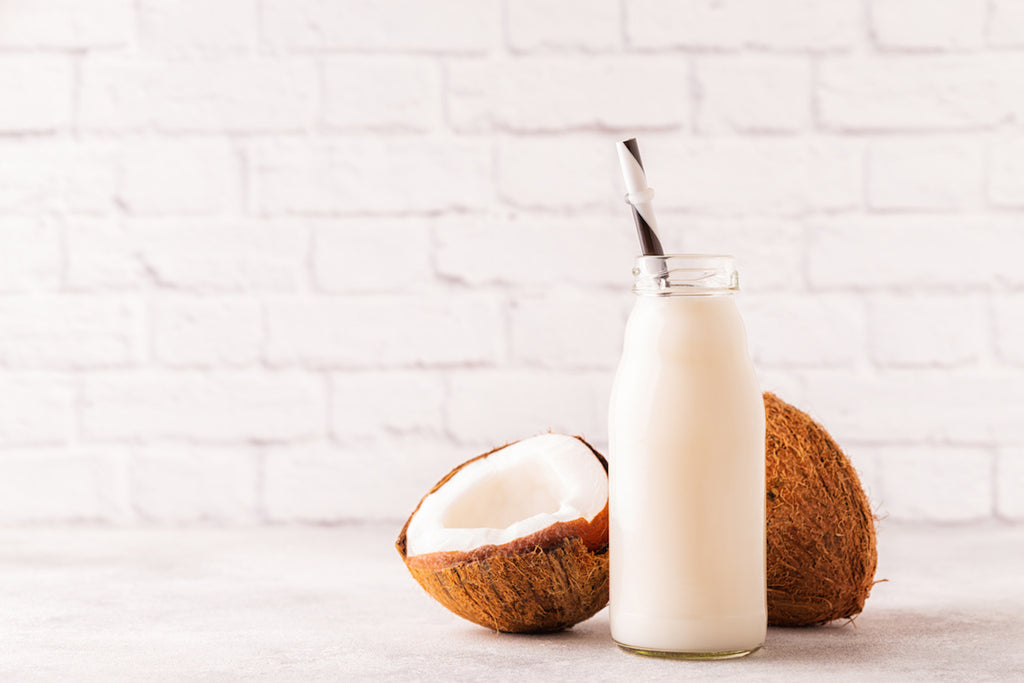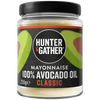Dairy products are among the many high-fat, low-carb staples on the ketogenic diet. However, not all dairy products make the keto diet cut.
Since keto dieters emphasise eating hard cheeses, full-fat Greek yoghurt, butter, ghee, and using heavy cream in coffee, you might be wondering, Is milk keto?
Let's find out...
Is Milk Keto-Friendly?
Cow’s milk is not keto-friendly. This goes for goat's milk and sheep's milk too. A cup of whole cow's milk (240 ml) is too high in carbs — at 12 grams of net carbs per serving — to qualify as a recommended keto food/drink [1].
And as soon as you start removing the milk fats to get to semi-skimmed or nonfat milk, the carb count just goes up, and your keto weight loss potential goes down.
In fact, pig farmers have traditionally skimmed the fat off the top of the milk for their families and fed the skimmed milk to the pigs to fatten them up before slaughter [2].
That's because milk contains lactose (milk sugar), and the moment you start removing the fat content from the milk, the higher the concentration of lactose per serving.
So what do you do if you're a milk lover and want to stick to the keto diet?
The answer comes in the form of milk alternatives that are low enough in net carbs but rich enough in flavour to replace dairy milk.
How To Choose a Keto-Friendly Milk Alternative

These days, the milk menu in coffee shops is as long as the list of fancy coffee concoctions you can order. In addition to the various cow’s milk choices, there's an ever-growing list of dairy-free options.
There's the nearly ubiquitous soy milk. Then there's almond milk, coconut milk, rice milk, oat milk, and cashew milk. The milk options feel endless, but are any of them any better than regular milk?
It depends.
As is the case with any and all meal plans, ingredients are everything. Whether you're at the coffee shop or simply shopping for something to pour over your keto granola, your first order of business is to look on the back of the carton for the nutrition label. (Don't be afraid to ask your barista to see the package. Sometimes they don't know what's in the milks either.)
The most critical question is sugar content. Always be sure that the non-dairy milk you're getting is unsweetened.
There's nothing more frustrating than accidentally derailing your progress when you believed you were doing everything right. If your goal is to keep your carb intake in the 20 gram range or less, drinking milk that contains half of that in your morning granola could seriously wreck your day. So opt for a milk substitute with zero added sugar.
The Best Low-Carb Milk Alternatives

What remains from the list of plant-based milks are those unsweetened milks made from nuts and seeds. The most widely available milk options that are acceptable on the keto diet are coconut milk and almond milk (again, always and exclusively the unsweetened varieties).
It's important still to look at the ingredients to ensure that there are no unnecessary additives or fillers that will raise the carb count beyond a reasonable level of zero to 5 carbs per serving. Much like eating nuts on the keto diet, serving size of nut milk is important. Nuts and seeds are not carb-free foods.
To ensure that you're getting the absolute purest nut or seed milk, you can make it yourself. It's a simple three-step process: soak, blend, strain.
But making your own nut milk is time-consuming and can also get pretty expensive, so this route isn't for everyone. Luckily, there are high-quality options available, often in the refrigerated section of your supermarket, but sometimes in cartons on the shelves.
Coconut Milk
Making coconut milk in any form is a lot more involved than making nut milk, and in the UK, fresh coconut isn't abundantly available, so purchasing is your best option. Coconut milk comes in a number of forms. The "drinking milk" variety is in the refrigerated section and comes in a carton, just as milk does. It's often a watered-down version of the very high-fat milk that comes from the coconut fruit itself — the thicker type of milk you'd use to make a Thai curry dish.
The thicker, more concentrated version of coconut milk typically comes canned or in a Tetra Pak, and is a very high-fat, calorie-dense food. A 100 ml serving contains 18 grams of fat (15.8 of which is saturated) and 2.3 net carbs — our personal favourite is Biona Organic Coconut Milk.
We're using a smaller serving size for this one, since it's highly unlikely you'll be drinking canned coconut milk as you would another type of nut milk. Of course, you have the option of adding water to your canned coconut milk to make it more suitable for your keto granola.
If you're looking for the ready-to-go, watered-down version of coconut milk to use as you would other nut milks, just make sure you recognise all the ingredients before purchasing. A 240 ml serving of this type of milk contains 5 grams of fat (all saturated) and 1 gram of carbs [8].
Almond Milk
A 240 ml serving of unsweetened almond milk contains 2.5 grams of fat and 0.3 grams of net carbs [9]. A number of brands make shelf-stable almond milks, but we've found that the most delicious varieties are fresh in the refrigerated section and contain fewer added ingredients.
Almond milk, the most readily available nut milk on the market, is great for baking, cooking, and splashing into coffee.
Other Nut and Seed Milks
For those with a nut allergy, you might consider sunflower milk, hemp milk or flaxseed milk. These all have similar nutrition profiles to almond milk without the risk of allergies. Other nut milk options include cashew milk and macadamia milk. A one-cup serving of cashew milk contains a similar carb count.

MCT Blends
When choosing the best milk alternative for your coffee, consider Thrive Coffee. This all-in-one instant blend already includes organic MCT fats, grass-fed EU butter, and natural creamy vanilla.
It's designed to support cognitive performance and reduce cravings, offering a creamy, delicious, and keto-friendly coffee experience without the need for additional milk or sweeteners. Just add hot water!
Easy.
Plant-Based Milks To Avoid

Now that we know we're on the hunt for only unsweetened, dairy-free milk alternatives, let's further whittle down the options. Grains and legumes aren't permissible on the keto diet, so it would follow that milks made from grains and legumes aren't ideal either.
Rice milk
A 240 ml serving of unsweetened rice milk still contains 22 grams of carbohydrates with 13 of that as sugar [3]. Even if you don't use that full serving size, even half that is far too dense with carbs to be acceptable on the keto diet. It's also from a grain, which is not recommended.
Oat milk
The same serving size of unsweetened oat milk contains 14 grams of net carbs. Oat milk does contain 3 grams of protein as well, to rice milk's zero, but in the grand scheme of your daily carb intake, this nutrition profile is not going to work [4]. It's also a grain-based milk and not recommended.
Soya milk
The first to hit the scene for dairy alternatives, soy milk and other soya-based dairy replacement products are by far the easiest to find. But, in addition to being too high in net carbs (13.2 grams per 240 ml), soya products come with a whole host of other potential problems [5]. For one, unless it's certified organic or specifically labeled, soya is a genetically modified food. It's one of the most common genetically modified foods imported to the UK [6]. Soya is also phytoestrogenic, meaning it has plant-based hormones that mimic estrogen and can be disruptive to your endocrine system if overconsumed, so we do not recommend it [7].
Acceptable Dairy on the Keto Diet

As we started off stating, full-fat, lactose-free, and low-lactose dairy are all keto-friendly. Hard cheeses, full-fat yogurt and sour cream, ghee, butter, and double cream are all wonderful foods with beneficial fatty acids. These dairy options are great for keto.
Heavy Cream
Double cream (from grass-fed cows, ideally) is an incredibly healthy keto food and a delicious, thick consistency that you’ll surely love. It's virtually lactose-free (although not completely), and it has a ton of uses in the kitchen beyond whipped cream and making an incredible cup of coffee. It’s great for cooking and baking, and makes an incredible base for high-fat smoothies or yummy keto desserts.
If you've tasted some of these plant-based milk options and none of them suits your fancy, consider mixing in a bit of double cream to get your keto milk to taste more like milk. We recommend starting with an 80/20 ratio of nut milk to cream, but you can play with it to see what works best for you.
Are Lactose-Free Milks Keto-Friendly?
Another potential option for cows dairy lovers is lactose-free milk. By removing the lactose, you are also lowering the carb content. Check out the nutritional info on the back of the packet before purchasing. If nut milk or dairy-free milks are not for you, there could be a space for lactose-free milk in your keto lifestyle.
Milk on Keto: You Have Choices

Whether you're making it from scratch or trying one at the supermarket, there are tons of options for keto milk alternatives. Not every brand tastes the same, and not every label looks the same. Always make sure to check your nutrition labels before heading to the till and don't get discouraged if you don't like the first one you try. You might find that you like one in your coffee, another for smoothies and third for dessert recipes. No matter what type of milk you pick, be sure to watch your serving sizes so you don't overdo it by accident.
All information provided on our website and within our articles is simply information, opinion, anecdotal thoughts and experiences to provide you with the tools to thrive.
It is not intended to treat or diagnose symptoms and is definitely not intended to be misconstrued for medical advice. We always advise you seek the advice of a trained professional when implementing any changes to your lifestyle and dietary habits.
We do however recommend seeking the services of a trained professional who questions the conventional wisdom to enable you to become the best version of yourself.
REFERENCES
[1] https://nutritiondata.self.com/facts/dairy-and-egg-products/69/2
[3] https://www.nutritionvalue.org/Beverages%2C_unsweetened%
2C_rice_milk_nutritional_value.html
[4] https://www.healthline.com/nutrition/oat-milk#nutrition
[5] https://nutritiondata.self.com/facts/legumes-and-legume-products/4387/2
[8] https://www.vitacost.com/imagine-foods-coconut-dream-coconut-drink-unsweetened-original-32-fl-oz-1
[9] https://www.verywellfit.com/almond-milk-nutrition-calories-carbs-and-benefits-4164247













